Marc’Antonio Ingegneri: Volume Two: Missa Voce Mea A5, Motets for double choir
The Cremonese composer Marc’Antonio Ingegneri (c. 1535/36–92) is chiefly remembered as the teacher of Claudio Monteverdi, while, for well-nigh 500 years, his own achievements were left to sit in the shadows. This second in a series of pioneering recordings from the Choir of Girton College, Cambridge, reveals Ingegneri to have been one of the masters of his age, writing music of breathtaking richness and beauty: the works heard here combine learned, intricate counterpoint with the kind of sheer sonic thrill that brings a shiver of physical excitement. It is, of course, religious music, but it is also extraordinarily passionate, to a degree not previously heard, nor for centuries to come, until the rise of the great Romantic choral works.
Choir of Girton College, Cambridge (Tracks 1–3, 5–8, 10, 12–14)
Historic Brass of the Royal Welsh College of Music and Drama (Tracks 1, 3–14)
Jeremy West, leader
Gareth Wilson, director
Listen To This Recording:
- Exultate Deo
- Voce Mea
- I Kyrie
- Domine, exaudi
- II Gloria
- Beata viscera
- III Credo
- Vidi Montes
- O pretiosum
- IV Sanctus – Benedictus
- O quam suavis
- V Agnus Dei
- Ave verum corpus
- Hodie assumpta est Maria
INGEGNERI
PAOLO ANIMUCCIA (formerly attrib. Cipriano de Rore)
INGEGNERI: Missa Voce mea a5
FIRST RECORDINGS
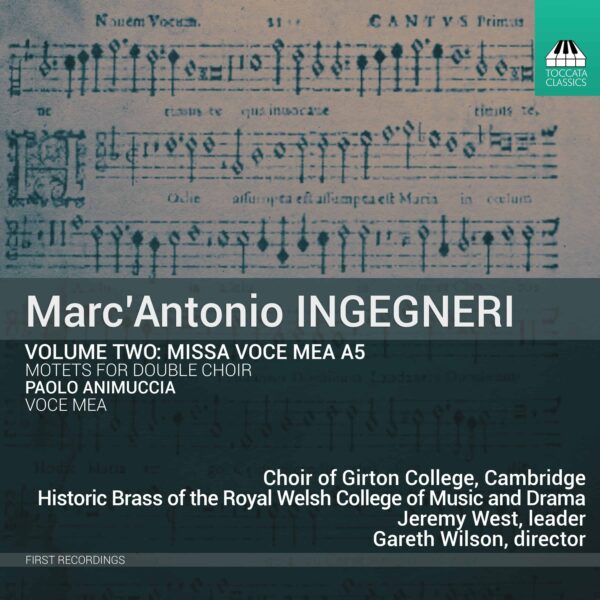
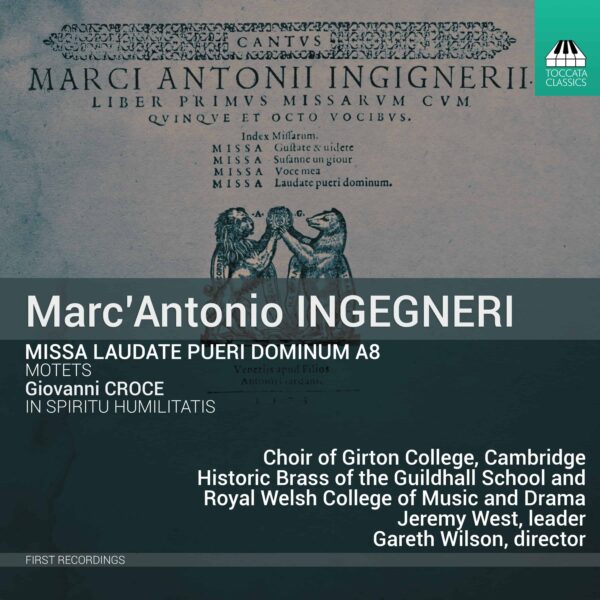
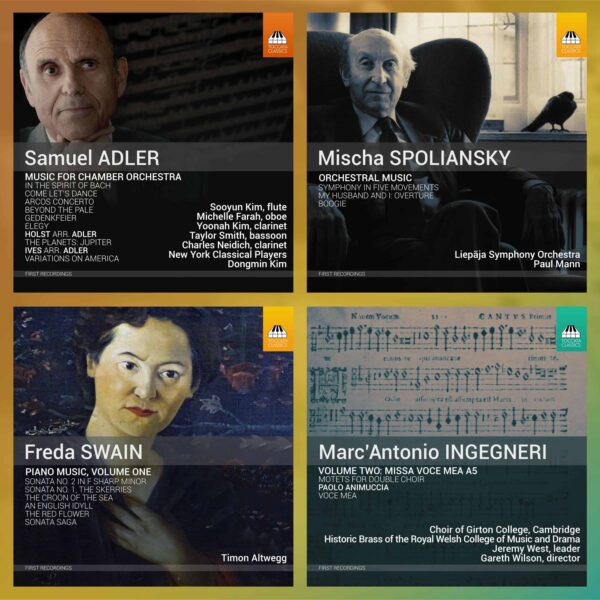
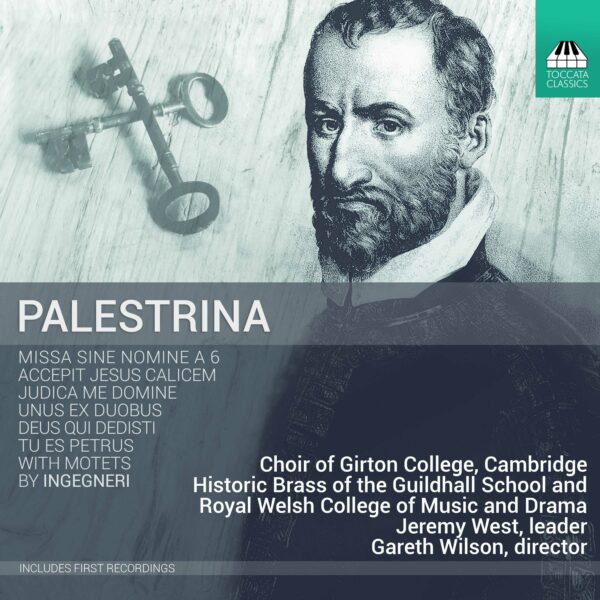
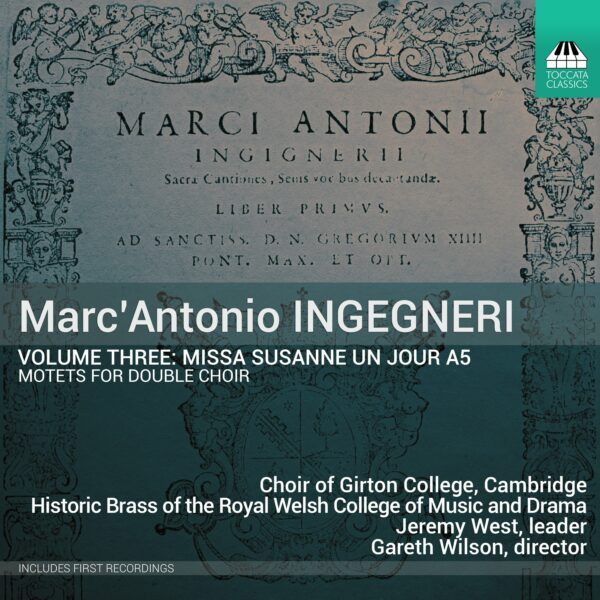
MusicWeb International :
‘The fine fresh-voiced choir seems completely devoted to this composer. They sing with the belief that this is great music.’
—Gary Higginson, MusicWeb International
Fanfare Magazine :
‘Highly recommended’
—J. F. Weber, Fanfare Magazine, Jan/Feb 2024
Planet Hugill :
‘Girton Choir’s second disc of music by Ingegneri reveals a wealth of hitherto unknown music, the rich textures amplified by the participation of historic brass to superb effect. […]
A remarkable achievement. […]
The music on this disc is all richly textured and immensely rewarding. […]
The simple colour of the lines, with a mix of singers and brass, is significantly different and Ingegneri’s rich textures come out as highly appealing and wonderfully all enveloping. This is sober, finely serious music suitable to a solemn sacred occasion, yet finely imaginative too. […]
[The motets] are glorious pieces and it is puzzling that they have remained unknown for such a long time. […]
The disc ends with a pair of motets which are especially striking. Ave Verum Corpus, with its lovely long lines and intersecting choirs, then Hodie assumpta est Maria where Ingegneri uses nine voices (the nine ranks of angels welcoming the Virgin into heaven) to stunning effect.’
—Robert Hugill, Planet Hugill
Cathedral Music :
‘‘The limpid, beguiling timbres establish this superb choir’s credentials right from the opening bars of this lates recording project – a second anthology of Marc’ Antonio Ingegneri’s superior output recorded at St George’s in Chesterton outside Cambridge. […]
[Ingegneri] thus was a somewhat younger contemporary of Palestrina with whom he is often (favourably) compared. […]
In broad terms, Ingegneri’s was a more concise style than Palestrina’s, though it is certainly no less ‘a thing of beauty and a joy for ever’. […]
The Girton choir, along with Historic Brass from the Royal Welsh College of Music and Drama, have done a grand job of enhancing the Verona-based musician’s reputation for all posterity. The movements of the Mass texts are imaginatively placed with motets interspersed between them.
It is surely a tribute to this second recording that it compelled your reviewer to send promptly to his regular supplier with an order for its immediate precursor as an early birthday present to himself.
The performance is enhanced by the brass players under the leadership of Jeremy Wise. All credit, too, to Toccata Classics engineer Dave Rowell, and producer Adrian Peacock, for working wonders with the balance. The chamber organs are a real joy. A final credit to the authoritative and informative notes from Carlos Rodrigues Otero and Gareth Wilson himself. Dr. Wilson master of the Renaissance vocal cadence as those who listen to this superb recording will appreciate throughout.’
—Simon Lindley, Cathedral Music
musica Dei donum :
‘That said, the result is very impressive, and these two discs give an excellent impression of what music may have sounded in Cremona Cathedral. […] The playing is wonderfully differentiated in dynamics and tempo.
These two splendid discs deserve a strong recommendation.’
—Johan van Veen, musica Dei donum
AllMusic :
‘The Choir of Girton College, Cambridge, and director Gareth Wilson have performed a tremendous service by bringing some of his music into the light on recordings, in a series of which this is the second release. In these performances, the music is something of a revelation. […] The program presents a five-voice parody mass along with its motet model by Paolo Animuccia, and its treatment of the model is remarkable. The excellent annotation by Carlos Rodríguez Otero calls it “almost obsessive.” The motets are so intensely beautiful that one wonders why they haven’t been performed more often. […] In any case, this is a real find. The notes also include moving reflections from Wilson on the difficulties of recording this music during a pandemic, offering much to consider. The sound engineering from St. George’s, Chesterton, Cambridge, works very well.’
—James Manheim, AllMusic
Choir & Organ :
‘The young voices of [Girton College, Cambridge] sparkle and shine for their second disc of works by Marc’antonio Ingegneri…this programme lives up to the promise of the first as Gareth Wilson continues his mission to restore Ingegneri to a suitably honoured position.’
—Choir & Organ